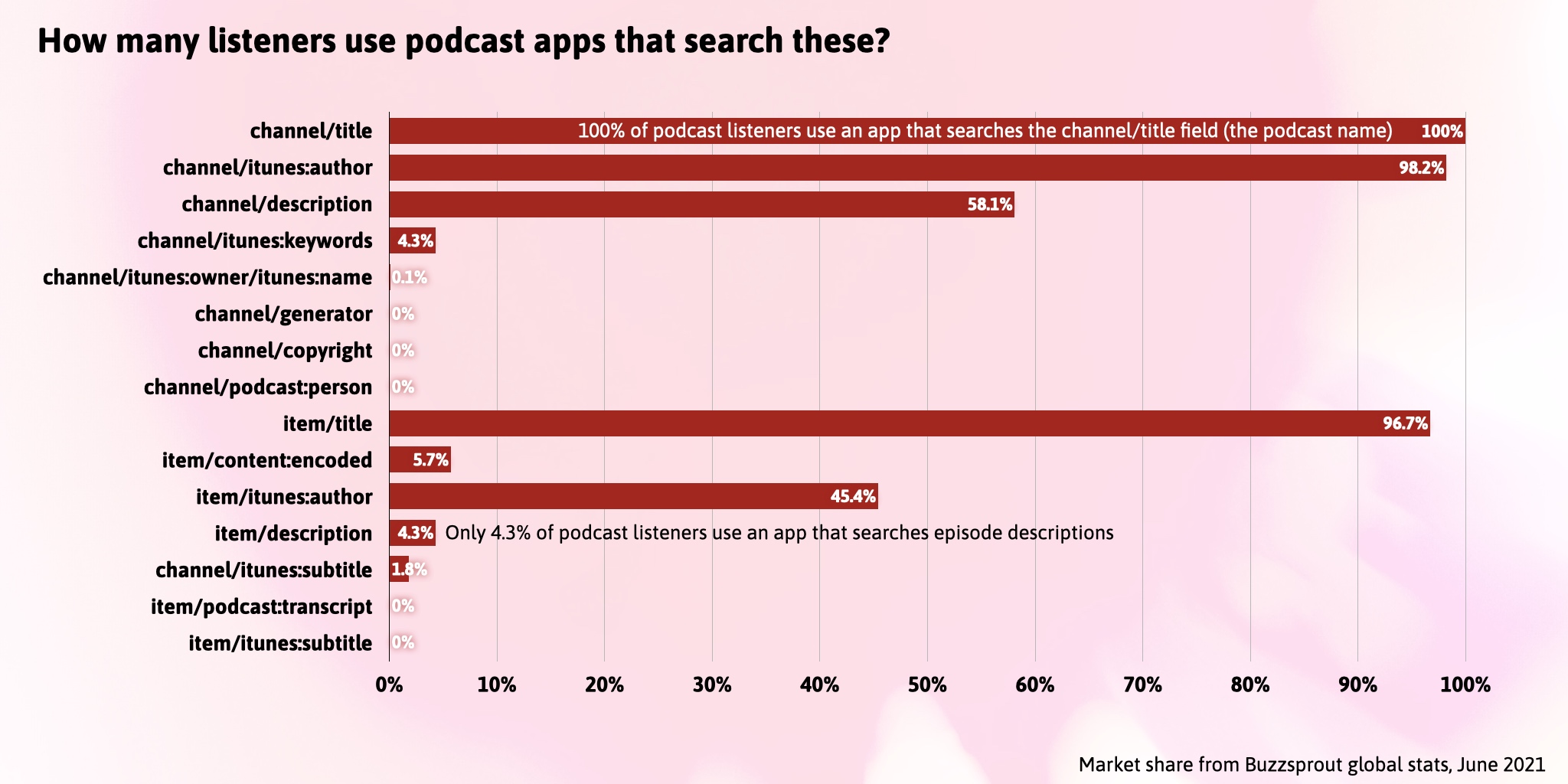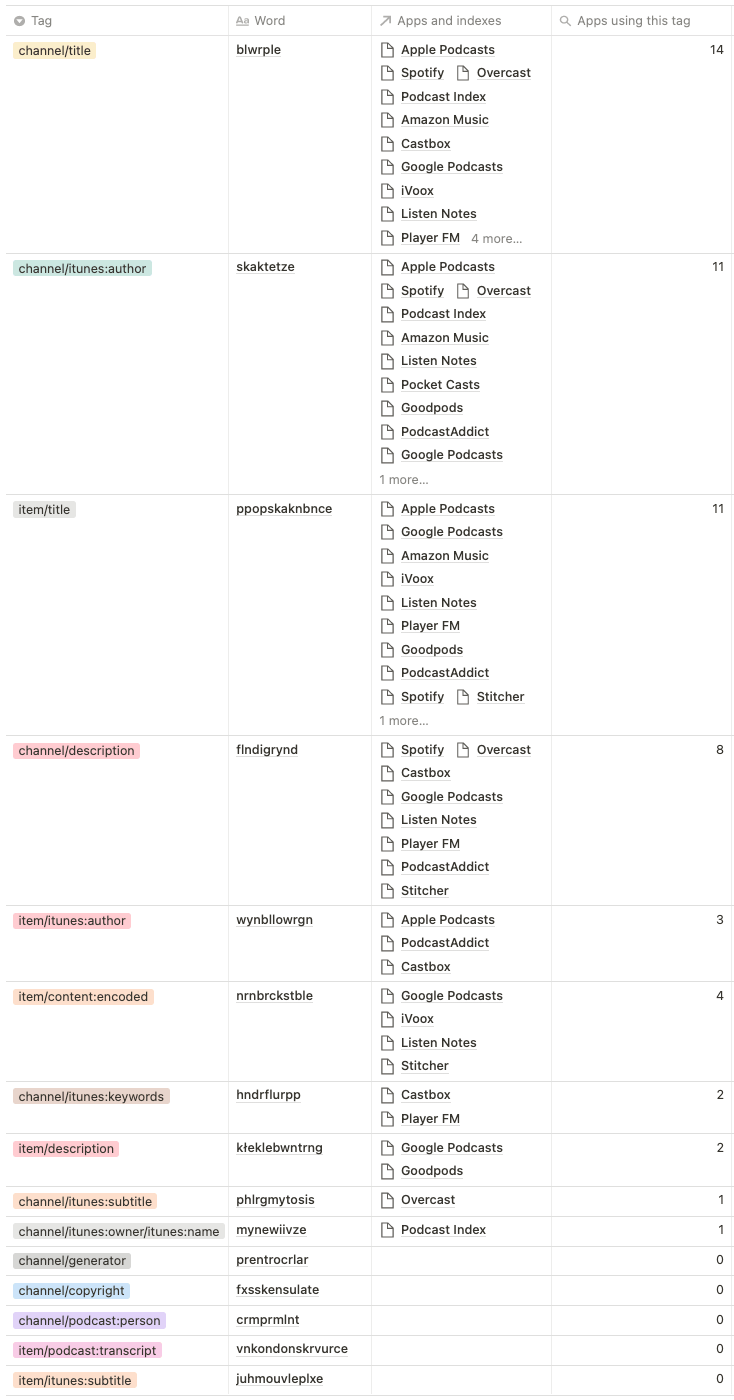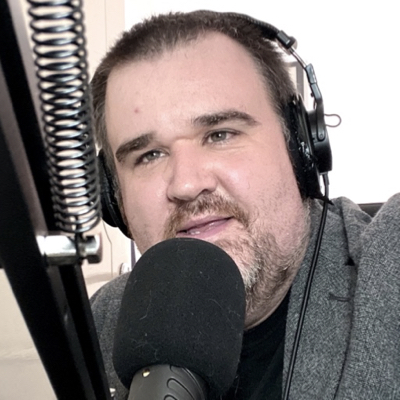
How people find your podcast in apps - who indexes what?
This article is at least a year old
Podcast metadata spans the spectrum from the minimal and functional to the obscure and mysterious to the highly-optimised and keyword-stuffed. For some, a title can be another form of creative expression, whereas for many – especially those podcasting for business, or with plans to monetise – it can feel like essential groundwork in garnering new listeners from search.
For years, the prevailing wisdom has been that your podcast name and episode titles are the biggest factor, but presumably a good, detailed but not over-long description can help capture some of those search terms that are relevant but would be too spammy to put in the title?
Well, sort of. The truth is that’s pretty much never been the case for Apple Podcasts, which only cares about your titles and your author tags. But what about the increasing number of equally-important or otherwise complementary podcast directories? Where do we need to focus our efforts if we want episodes to surface for relevant search terms, and how can we avoid filling our titles with word salad?
Key points
- Apple Podcasts only searches your podcast name, episode titles, and author tags (this may not be news to many old-school podcasters, as it’s been the long-prevailing wisdom).
- No-one indexes the
copyrighttag. Probably not a surprise. - No-one indexes the
podcast:persontag. I found this surprising. - Apps heavily weight podcast-level data over episode-level data.
- Podcast app SEO is not a viable strategy.
- The in-app podcast search landscape is badly in need of attention.
Who indexes which tags?
I teamed up with James, the editor of Podnews, to perform some experiments on a couple of our feeds we knew wouldn’t cause waves of confusion were we to stuff them full of nonsense words in the name of science. So James updated the metadata for his Podclock podcast, and I did the same with a now-moribund feed.
The idea was to pick a different nonsense word for each relevant podcast-related tag in our RSS feeds, and to see which apps picked up which words.
Apps surveyed
For our experiment, we limited the list of apps to
- Amazon Music
- Apple Podcasts
- CastBox
- GoodPods
- Google Podcasts
- IVoox
- Listen Notes
- Overcast
- Player FM
- Pocket Casts
- The Podcast Index website
- PodcastAddict
- Spotify
- Stitcher
This list represents the most popular podcast apps, and all podcast apps with more than 1% market share according to typical podcast host reports.
Channel-level tags
These are the tags in a podcast’s RSS feed that relate to the podcast as a whole, not individual episodes. If your podcast covers one particular topic in-depth or you’re looking to build a community around a specific area of interest, your podcast-level metadata may be a key contributor to your success in search. So, let’s look at what podcast-level metadata is being indexed.
<title>
Unsurprisingly, a search on your podcast name will return your podcast in all apps. If it doesn’t, that probably means your title is too common. The word 'Podcast’ in your title probably doesn’t help your SEO either, since Podcast Index data suggests that more than 600,000 shows have that word in the title.
<description>
Castbox, Google Podcasts, Listen Notes, Player FM, PodcastAddict, Spotify, and Stitcher all add your podcast description to their indexes, so info you add here will surface in search. Overcast’s web search will also surface info from your description, but crucially this does not apply to the app.
That means Apple Podcasts, Amazon Music and Pocket Casts do not index your podcast’s description.
<podcast:person>
The new Podcasting 2.0 tag for storing info about who contributes to a podcast is not being used in any search engine we surveyed. This includes the Podcast Index itself.
I’m a little sad about this – even if not surprised to see it snubbed by established apps – as guest and host names feel like something people would want to search on. However, past conversations with the tech team at Podchaser have led me to understand these tags are ripe for spammers, who’ll put any old famous name in there in the hopes it’ll result in more downloads.
This isn’t to suggest the tag has no value. Far from it. Just because the names aren’t being surfaced in search results doesn’t mean it’s not a great way to link podcasts together, but I’d love to see it influence results for guest-based podcasts. Still, early days.
<itunes:author>
iVoox, Player FM and Stitcher were the only apps not to index this tag.
<itunes:subtitle>
Again, the only time this came up was in Overcast’s web search, but not in the app. That essentially means this tag is not being indexed in any meaningful way. Unsurprisingly so, since this tag has been removed from the Apple Podcasts RSS guide.
<itunes:owner>
The only meaningful place this turned up was the Podcast Index website. Other than that, consider this tag for informational purposes only.
<itunes:keywords>
This tag is no longer in the Apple Podcasts RSS guide, which is understandable given that it has as much use as your website’s <meta> keyword tags. That said, CastBox and Player FM still index this tag, so if you just wanted to cater to users of those apps and those apps alone, knock yourself out.
Item-level tags
These are the tags that relate to each episode in your podcast. If you cover uniquely different topics or have interesting guests each episode, chances are this is the ground you’ll be fighting for in search, as if you can meet a prospective listener’s need with a specific and relevant episode, you might just have hooked a new subscriber. So let’s look at what episode-level metadata apps and directories are indexed.
<title>
The Podcast Index, Pocket Casts and Overcast are the only apps not to surface episode-level titles in search. What that shows me is that these apps are much more focused on discovery of podcast series – not individual episodes – by keyword.
Also, you need to tell CastBox that you want to search by episode, as its search engine isn’t smart enough to search both podcast-level and episode-level metadata at the same time.
<description>
The plain-text podcast description is only being indexed by Google Podcasts and GoodPods. I have been thinking it’s best ignoring this tag as apps can’t decide on whether to allow HTML or not, though recently support appears to be a little more consistent.
<content:encoded>
This is where your show notes live. However, Google Podcasts, iVoox, Stitcher, and Listen Notes are the only apps that index rich-text episode descriptions.
It may be that if <content:encoded> is present, aggregators ingest this information instead of the <description>, and this is what we’re uncovering here. This certainly happens when some apps display episode descriptions. This might need a little more investigation.
<itunes:subtitle>
This deprecated tag is a wasteland. It’s not the only tag to garner no search results across the apps we surveyed, but it’s one of the few that surprises me a little, so I thought it worth mentioning.
<itunes:author>
Apple Podcasts, CastBox, and PodcastAddict are the only apps to index the episode-level author tag.
The state of podcast-app SEO
Unless you’re going to operate like the minority of podcasts that keyword-stuff their titles – which is a bit tacky and against Apple’s guidelines – I think it’s unwise to put too many eggs in the podcast-app search basket. Search is just not evolved enough within these apps to be meaningful.
CastBox and Google Podcasts are the hungriest apps, indexing the most amount of tags. Pocket Casts was surprising in that it appeared to index only the most basic of podcast-level metadata.
To me these findings highlight the need for good podcast websites. Compelling titles, rich and meaningful show notes, useful links, host and guest bios; all of these are useful for placement within Google and other web search engines because they’re useful to humans. But there are some gaps in podcast search that need to be filled, even if at the expense of letting in a little spam.
For what it’s worth, I don’t think keyword spam is a consideration being made by these apps. I think it’s simply that not enough time or effort has been put into good search database design. Many apps are powered by quite rudimentary relational databases that perform well for linking one table to another, but perform less well for full-text search.
For apps like Overcast, Pocket Casts, and Spotify, search seems to exist mainly to allow a podcast to be found by name, rather than by topic.
What to do with these findings
If you’re already working to best practises, nothing in these findings should change your behaviour. Maybe it’ll remove a couple of things from the pipeline, since it really doesn’t matter if you have a relevant set of keywords in your feed, for example.
As a podcast producer, this helps cement certain key points:
- If you have a guest, put their name in your episode title, especially if they’re the kind of name people will search podcast apps for.
- That said, episode titles aren’t universally indexed.
- Don’t rely on podcast app search for discoverability.
I have a Hitchhiker’s Guide to the Galaxy podcast. It’s called Beware of the Leopard, which is a well-known reference to a line in the first episode of the radio show (it’s also in the book, the TV show, and the film). But you wont find my podcast by searching for “hitchhikers guide to the galaxy” (in most apps at least). You might find it if you search one of the place or character names (like “arthur dent”), but only if we mentioned one of them in the episode title.
This is obviously a failing on my part, since “Beware of the Leopard – the Hitchhiker’s Guide to the Galaxy podcast” isn’t an unreasonably-long or thirsty name, but it feels a bit clumsy, and since my podcast website is powered by my podcast host, I’d be taking up a lot of screen real-estate by more-than-doubling my podcast title length (this isn’t a problem if you run your own website).
As John Dinkel spotted in January 2020, Parcast has an SEO strategy when it comes to titling their podcasts that might be worth considering.
In-app search is not where you’ll be found
The best podcast players do one thing really well: play podcasts. I think we as podcasters assume that the burden of responsibility for “discoverability 🤮” is on their shoulders, but that’s not what podcast apps are for… they’re for playing podcasts.
GoodPods is an app for discoverability more than it is a player, so I’d love to see them do more in search.
App developers have an opportunity to improve the space, by implementing more than the rudimentary full-text search their database allows. MongoDB is a flexible database which is great for storing episodes alongside series, and its full-text index is pretty good. Then of course there are search-first database engines like Elasticsearch and Solr, and super-simple ones like Whoosh and Xapian. A judicious mix of indexing and weighting – where the developer decides which fields are more likely to be of importance to the user – and perhaps a bit of sugar added to the final score for each result – like the number of people in your app subscribed to the feed, how frequently it puts out episodes, how recently it has been updated, or how long it’s been around for – can all contribute to a healthy in-app search.
In time, this may get easier with transcripts. We haven’t tested full transcripts, but that might be an experiment worth running at some point. Here I’m not necessarily thinking about adding data into your transcript that a search engine will like, but instead thinking longer-term about how podcast marketplaces will use their own in-house transcripts to boost search, which is something Castbox, and sometimes Apple Podcasts, already does. Spotify has also said that they’ll be using transcripts to boost their search in future.
I was in the web development game long before I got paid to make podcasts, and SEO was a topic that came up a lot, as you might imagine. The fundamental truths haven’t changed in the last 15 years or so: search engines are there to help people find things, not to help customers find businesses (or in our case, podcasts to find listeners). Our job is to make the best possible podcast we can, and to use metadata to describe it in a way that is helpful to humans. Like fashion, the rules of good and bad SEO change with the seasons, and trying to keep on top of them at all times is tiring and ultimately only ever leads to short-term wins.
A great way to get new listeners to a single episode is to stuff your podcast name and episode title with keywords. But it’s not how you keep them, and it’s not how you build trust with them.
The object is not to find new listeners through these apps (unless you’re paying for ads within them). Instead, make your podcast easy to find by name, so that when people read your insightful tweet, your on-point newsletter submission, your helpful blog post or your conference talk slide, they know exactly what to search for, whichever app they use.
This data in context: market share
James Cridland adds: As an afterthought, it’s worthwhile looking at the market share of the apps that were tested. I took that data from Buzzsprout’s global stats figures from June, and overlaid them on the results to help us know where to put our energy as podcasters.
Only 4.3% of podcast listeners use an app that searches episode descriptions (or, more accurately, only 4.3% of downloads from podcast apps come from those that support searching through episode descriptions). Another reason, perhaps, to focus a little more on episode titles?

Research
Download the CSVs: trackable words · apps and indexes · podcasts

Listen


































































































